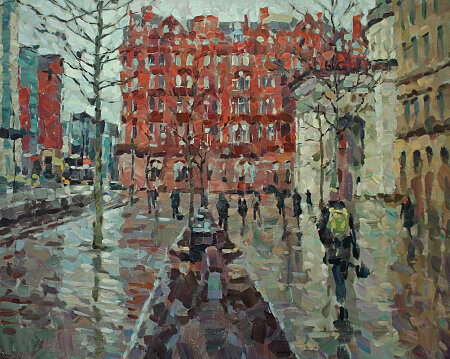
Ann Northcott and the Russian Palace
A lot of us had gathered on a snowy Friday night at a big suburban house, rambling old place, parents tucked away on an upper floor, and I was excited to see Ann Northcott there, and disappointed to see Preston, whose last name I’ve forgotten. Ann was fairly new to the group. She was two years younger than I was. Her startling beauty and diminutive figure made her a central attraction, which she would disclaim with embarrassment by walking away, being of a distant, diffident disposition. Preston I admired, feared, and against my better judgment disliked. He was the kind of guy who could, with a gentle speech, bring a confused meeting of kids to order and make everyone listen. He’d had a letter published in the Times, something about community services for youth, and he entered every gathering believing that everyone was still talking about this letter six months later. Also he was good-looking. Compact frame, great hair. And I saw him homing in on Ann Northcott.
As I sipped a Seven-Up, I balefully watched Preston persuade Ann to take a walk with him in the snow. The snow is really pretty, I heard him say. He had been reading Martin Buber, the I and Thou theologian, talking about him constantly, his philosophy of the personal encounter. I wondered what Ann would think of a personal encounter with Preston.
When they returned twenty minutes later, someone said, Preston, isn’t it cold out there? I was warm, he replied with a grin. To myself at the time I called it a smirk.
I stood on a second-floor gallery, looking over the scene. Paintings hung in the gallery, vibrant impressionist works that struck me with their deep, saturated colors. Later, I would learn they were by a Russian artist, an escapee from Soviet Russia, whose name I’ve forgotten. I studied them and felt a sense of unsuspected possibilities. My own home lacked any such art, though it did have books and music. I returned my attention to the people down below. Music played. Carole, a heavy-set girl with glasses whose house it was, moved about, restocking snacks and sodas. Vodka made a clandestine circuit. At origin, this was a church youth-fellowship group, though there were also plenty of unchurched kids looking for people to hang out with, which was fine. Kids talked of being mutually sensitive. I wanted to be mutually sensitive with Ann Northcott. I saw her with two girlfriends in the kitchen, wielding a long pair of scissors, clanking them together ostentatiously and laughing, cutting chunks of her rough blonde hair, which was thick and tangled. It’s not even, someone said. I don’t want it even, Ann said. I hate it even.
Carole had buttonholed Preston about Martin Buber, so I decided to make my own snow move. Ann never looked at you when you spoke to her, but she nodded and from a peg lifted down her big, dark-gray winter coat, still snowy and dripping, and out we went. For some reason, I’ve always had a thing for girls in big coats, the way their hair bunches over the collar. The snowstorm blew thick and massive, covering all of metropolitan New York. Flakes spun in the streetlights.
Snow cosmos, I said. I tended to say things like that to girls, to get a reaction, to make an impression, believing I was seeding the universe with strange and joyous wit. Ann did not react. She walked along with her coat open. Big snowflakes landed on her white blouse, there to be assassinated.
Shouldn’t you button that coat up?
She skipped ahead, coat even wider to the snow. I trotted to catch up, rounded in front of her, seized the two sides of her coat and tried to button it for her. Now she looked me squarely in the face, our breath vapor puffing together, and she giggled as I found myself unable to manage all of the buttons. She really was stunning. High clear brow, dark brown eyes, dark unplucked eyebrows, elegant saucy nose with a delicate cleft tip, pretty lips that twitched, expression impish when it wasn’t vacant and desolate. She wore no makeup. And that blonde roughness of hair, which I wanted to put my hands into, hair as gloriously unruly as her character, it seemed to me. Excitement was what I felt when I looked at her, an uncanny excitement, the excitement you feel when you walk out into a windy dawn.
Let’s go back, she said. I’m tired of snow.
*
Later, I persuaded her to climb the stairs to the second-floor gallery, from which, that not interesting her, we went up to the third floor, a dim hallway I’d discovered earlier, also hung with paintings. We stood by a small table, set our drinks there.
Do you read the Town Review? I asked. It was our local literary journal.
I’ve seen it.
I have a short piece in it.
That’s nice. Do you have a cigarette?
No. It’s sort of a cross between a story and a poem.
I don’t read if I don’t have to. I hate language, hate to write.
‘I hate language,’ she says, using language.
I don’t know how else to say it.
That’s my point. Did you read Preston’s letter in the Times?
No.
At least you’re consistent.
Wasn’t that, like, six months ago?
